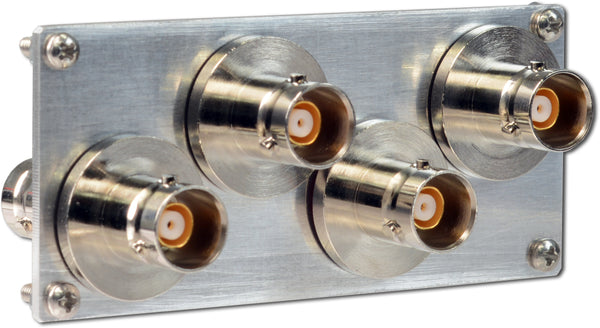Applications:
|
|
Features:
|
|
DescriptionThe PRL-350P is a ready-to-use, high speed dual-channel comparator module. The PRL-350P has a maximum clock frequency in excess of 300 MHz and has complementary PECL outputs designed for driving 50 Ω transmission lines terminated to 50 Ω/+3 V. All models have DC coupled 50 Ω inputs and outputs. Input threshold voltage can be selected either from a set of preset values of +50 mV, 0 V or 50 mV using a common three-position switch, or varied independently in each channel by applying a DC voltage to one of the two inputs. The input Common Mode Range is -2.0 V to +3.0 V. The input threshold voltage can also be varied independently in each channel by applying an external DC bias voltage or shunt resistor to the D input.
These high speed comparators are Mini Modular Instruments ™ that can be used as peak detectors, threshold detectors, sine wave to square wave converters, window comparators or differential line receivers, etc. Typical minimum input voltage required at 300 MHz is 10 mVPP into 50 Ω. Each unit is supplied with a ±8.5 V AC/DC Adapter and housed in an attractive 1.3 x 2.9 x 3.9-in. extruded aluminum enclosure. |
 Fig. 1C PRL-350P Block Diagram
Fig. 1C PRL-350P Block Diagram*For the PRL-350P an unused complementary output must be either terminated into 50 Ω/+3 V or AC-coupled into a 50 Ω load; otherwise, output waveform distortion and rise time degradation will occur.
Use the four channel PECL Terminator for the 50 Ω/+3 V termination and for connection of PECL signals to 50 Ω input oscilloscopes.
For optimum performance, however, all outputs should be terminated.

Anritsu Application Note for PON Module Testing with Anritsu MP1800A
Signal Quality Analyzer and PRL-350 Series Comparators (1.1 MB PDF)
BERT Level Translation
Anritsu engineers and customers around the world rely on our PRL-350 Series comparators for level conversion when testing Passive Optical Network (PON) modules.
PON module testing often requires converting the -1.0 to 0 V signals output by the MU181020A Pulse Pattern Generator cards to the LVTTL, PECL or LVPECL levels required by many ONU and OLT modules, typically for the Data, Pre-bias, and Reset signals.
Popular models include:
- PRL-350TTL, Dual Channel Comparator with TTL Outputs
- PRL-350LP, Dual Channel Comparator with LVPECL Outputs
- PRL-350P, Dual Channel Comparator with PECL Outputs
App Note and block diagram copyright and courtesy of Anritsu Corporation.
(0° C ≤ TA ≤ 35° C)*
Unless otherwise specified, dynamic measurements are made with all outputs terminated into 50 Ω/VTT, where VTT = +3 V for PECL outputs.
| Symbol | Parameter | PRL-350P | Unit | ||
|---|---|---|---|---|---|
| Min | Typ | Max | |||
| RIN | Input Resistance | 49.5 | 50 | 50.5 | Ω |
| ROUT | Output Resistance | 49.5 | 50 | 50.5 | Ω |
| VTH+ | Preset positive threshold voltage | 45 | 50 | 55 | mV |
| VTH- | Preset negative threshold voltage | -55 | -50 | -45 | mV |
| VTH0 | Preset zero threshold voltage(1) | -10 | 0 | 10 | mV |
| VOL | Output Low Level | 3.2 | 3.4 | 3.5 | V |
| VOH | Output High Level | 3.9 | 4.1 | 4.3 | V |
| IDC1 | DC Input Current, +8.5 V | 175 | 200 | mA | |
| IDC2 | DC Input Current, -8.5 V | -325 | -350 | mA | |
| VDC | DC Input Voltage | ±7.5 | ±8.5 | ±12 | V |
| VAC | AC/DC Adapter Input Voltage | 103 | 115 | 127 | V |
| tPLH | Propagation Delay to output↑ | 1.8 | ns | ||
| tPHL | Propagation Delay to output↓ | 1.8 | ns | ||
| tr/tf | Rise/Fall Times(2) | 1100 | 1250 | ps | |
| tSKEW | Skew between any 2 outputs | 750 | 1000 | ps | |
| Vin I | Minimum Input Voltage @ 150 MHz(1) | 20 | 10 | mVPP | |
| Vin II | Minimum Input Voltage @ 250 MHz(1) | 40 | 20 | mVPP | |
| VCM | Input Common Mode Range | -2.0 | +3.0 | V | |
| fmax | Max. Clock Frequency | 300 | 330 | MHz | |
| Size | 1.3 x 2.9 x 3.9 | in. | |||
| Weight, w/o AC adapter | 7 | Oz | |||
| Shipping weight, w/AC adapter | 4 | lb | |||
(1) In order to reduce jitter near fMAX, terminate the non-driven input into an AC coupled 50 Ω termination, such as the PRL-ACT-50, Dual‑channel AC‑coupled 50 Ω Termination module, when the input voltage is less than 20 mVPP.
(2) 20%-80% for PECL. For the PRL-350P, an unused complementary output must be either terminated into 50 Ω/VTT or AC coupled into a 50 Ω load; otherwise, output waveform distortion and rise time degradation will occur. Use the PRL-ACT-50 Dual Channel AC-Coupled 50 Ω Termination for terminating unused complementary outputs. Use the PRL-550PQ4X four channel PECL Terminator for the 50 Ω/VTT termination and for connection of PECL signals to 50 Ω input oscilloscopes. If preservation of DC levels is not required, then the PRL-SC-104, 0.1 µf DC block or 12 dB AC-coupled attenuator may be used to connect the PECL outputs to 50 Ω input instruments.







